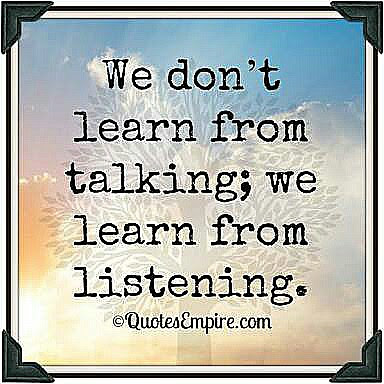Pop Quiz: Which skill is more important: English speaking skill or English listening skill? If you answered English listening skill, give yourself a pat on the back! This post will explain why.
In a previous POST, we talked about how important active listening is in communicating effectively with our customer. Even if you were the best English speaking rep on the floor but if your English listening skill sucks, then you can talk the entire shift without really addressing your customer’s main concern. You just wasted your customer’s time and gave her a bad customer experience.
Listening to your customer should not be so difficult; all you need to do is give her your 100% attention. The difficulty lies in the fact that the English language seems to have a kaleidoscope of variations. I’m sure you’ve had your share of those moments when you press your headset hard against your ears doing your best to focus on your call fully aware your customer’s speaking English but unable to decipher what she just said. That’s because English is a pretty tricky language. A Brit would pronounce the same word so differently from how an Aussie, or an Asian or a Yank would. Even a Yank from the Ozarks would say the same word quite so different from how a Yank from Chicago would. According to Call Center Manager and fellow blogger MARLON CELSO, we have to recognize and respect certain “nuances” every caller has. If you handle a US account, remember that America is a nation largely made up of a diversity of peoples and races from all across the globe so you have to anticipate that not every customer will speak English the same way even if they were from the same time zone. You will even get customers who can barely speak English at all so you need to anticipate these challenges as well.
TIP #1: CHOOSE YOUR TV PROGRAMS
No offense to those soap operas, telenovelas and noontime gag shows but I don’t see any educational value in them. They may be entertaining but definitely not educational as far as improving your English listening skill is concerned. If you’re really serious about improving your English listening skill, I strongly suggest you ditch those soaps for more intellectually stimulating channels like CNN, Fox News, BBC, HISTORY, DISCOVERY, NAT GEO and other similar English language channels. It would be helpful to listen to a broad diversity of English language programs coming from London, Australia, Canada, and from several US states like San Francisco, New Mexico, Nevada, New York, Chicago, Texas, Louisiana, and others. Personally, I am particularly fond of reality programs like The Pickers, Swamp People, Border Security Australia, TRUTV, The Tonight Show and others mainly because most episodes are so natural and mostly unscripted. Each program provides you a slice of the culture, humor and nuances unique to a particular country or State. The aim here is to listen to the English language spoken in a broad diversity: Koreans, Filipinos and other Asians in San Francisco, Native Americans in Nevada, Hispanics and Latinos in New Mexico, Italians in New York, Creoles in Louisiana, the Canadians, the Brits, the Aussies, and every one else who speak English in their own peculiar way. Be particularly focused on accents, nuances, temperaments and commonly used idioms. Learn their culture or “CULCHA” as the Aussies would say! Eventually, after listening to these diverse versions of the English language for a while, you get used to these nuances and peculiarities until they start to sound common and almost second nature to you. You can even go as far as confidently guess which State or country the customer is from.TIP #2: LISTEN WITHOUT WATCHING
This time, we turn the challenge up a notch. With your favorite English TV show or movie playing, close your eyes and just listen. Don’t watch! Just listen. And try not to fall asleep either. The logic here is that we only get to listen to our customers but never see them over the phone. By training ourselves to “watch” the TV show with just our ears, we learn to focus on their words and try to understand what they’re saying without the benefit of seeing their lips or their body language. Again, learn to listen to a broad diversity of English TV shows so that you can listen to different accents, idioms and nuances. Once you’re quite accustomed to listening to these different shows, let’s turn the challenge another notch higher by going court stenographer at home. With the TV on, go to your laptop and try to listen and type down what you heard or what you think you heard on TV. It doesn’t have to be verbatim unless you can type real fast. You just need to have a way to confirm the gradual improvement you have been achieving since you started these English listening skill improvement tips. Besides, you’re also practicing a real-world task of typing down notes of what the customer is saying. And if I’m not mistaken, you probably went through this same exercise when you applied as a call center agent. It’s so motivating to see how much improvement you have made so far. Go give yourself a pat on the back. You deserve it! As the Brits would say,” Cheerio! Jolly good show chap!”TIP #3: BE FAMILIAR WITH IDIOMS
By now, you probably have been listening to those English TV shows for a while and hopefully have noticed a marked improvement in your English listening skill. The next step is to be familiar with idioms, phrases and expressions you commonly hear on those shows. Make a list of expressions and idioms you frequently hear. Leave out those colorful F words because you obviously won’t be cussing on the phone or hopefully don’t have to. Right about here would be your best opportunity to Google any idiomatic expression or phrase you aren’t familiar with so that when you again encounter those idioms you already know what the customer is trying to say. We don’t necessarily have to use these idioms and phrases when talking with our customers but it would be nice to at least be familiar with these expressions just in case we need to break the ice or build rapport. Imagine if your customer tries to be friendly and dishes out a joke using a phrase or expression you’re totally unfamiliar with and all you can say is “uh-huh”. Awkward isn’t it? Best be ready when the need arises.TIP #4: RATE YOUR ENGLISH LISTENING SKILL
Finally, just so you’d be more confident with your English listening skill, I strongly suggest you rate yourself by taking an English Listening Skill Level Test. There are several sites available on the internet that you can try. I have listed at least two English listening skill test links below. I encourage you to try these tests. I suggest you take these tests before and after practicing the English listening skill improvement tips in this article so you can document how much improvement you actually made.•English Listening Skill Test 1
•English Listening Skill Test 2
Your English listening skill plays an important role in accurately and efficiently resolving issues and making your customer happy. Hopefully, you will find these English listening skill improvement tips helpful in becoming more confident and successful in your job.
If you found this article useful please click SHARE so your friends can benefit from these English listening skill improvement tips as well. Thank you!




No comments:
Post a Comment